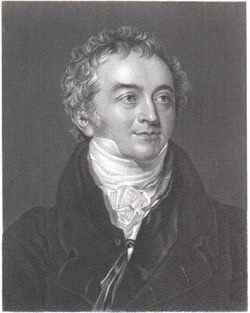
BIOGRAPHY OF THOMAS YOUNG (1773 - 1829)
-
born Jun. 13, 1773, England.
died May 10, 1829, England.
|
|
BIOGRAPHY OF THOMAS YOUNG (1773 - 1829)
died May 10, 1829, England. |
Thomas Young (June 13, 1773 – May 10, 1829) was an English scientist, researcher, physician and polymath.
He is sometimes considered to be "the last person to know everything": that is, he was familiar with virtually all the
contemporary Western academic knowledge at that point in history. Clearly this can never be verified, and other claimants to this title are Gottfried Leibniz, Leonardo da Vinci, Samuel Taylor Coleridge, Johann Wolfgang Goethe and Francis Bacon, among others.
Young also wrote about various subjects to contemporary editions of the Encyclopedia
Britannica. His learning was so prodigious in scope and breadth that he was popularly known as "Phenomenon Young."
Young belonged to a Quaker family of Milverton, Somerset, where he was born in 1773, the youngest of ten children.
At the age of fourteen Young had learned Greek, Latin, French, Italian, Hebrew, Chaldean, Syriac, Samaritan, Arabic,
Persian, Turkish and Amharic [1,2].
Young began to study medicine in London in 1792, moved to Edinburgh in 1794, and a year later went to Go"ttingen,
where he obtained the degree of doctor of physics in 1796. In 1797 he entered Emmanuel College, Cambridge.
In the same year he inherited the estate of his grand-uncle, Richard Brocklesby, which made him financially independent,
and in 1799 he established himself as a physician in Welbeck Street, London. Young published many of his first academic
articles anonymously to protect his reputation as a physician.
In 1801 Young was appointed professor of "natural philosophy" (mainly physics) at the Royal Institution.
In two years he delivered 91 lectures. In 1802, he was appointed foreign secretary of the Royal Society, of which he
had been elected a fellow in 1794. He resigned his professorship in 1803, fearing that its duties would interfere with
his medical practice. His lectures were published in 1807 in the Course of Lectures on Natural Philosophy and contain a
number of anticipations of later theories.
Young coined the very term ENERGY in 1807 at his "LECTURES ON NATURAL PHILOSOPHY", London, v.1, 1807, pp78-79.
In 1811 Young became physician to St. George's Hospital, and in 1814 he served on a committee appointed to consider the dangers involved by the general introduction of gas into London. In 1816 he was secretary of a commission charged with ascertaining the length of the second's pendulum, and in 1818 he became secretary to the Board of Longitude and superintendent of the HM Nautical Almanac Office.
Selected writings of Thomas Young:
A Course of Lectures on Natural Philosophy and the Mechanical Arts (1807, republished 2002 by Thoemmes Press).
Miscellaneous Works of the Late Thomas Young, M.D., F.R.S. (1855, 3 volumes, editor John Murray, republished
2003 by Thoemmes Press).
References:
1. Singh, Simon (2000). The Code Book: The Science of Secrecy from Ancient Egypt to Quantum
Cryptography. Anchor. ISBN 0-385-49532-3.
2. Andrew Robinson, Thomas Young: The man who knew everything (History Today April 2006).
This article incorporates text from the Encyclopedia Britannica Eleventh Edition, a publication now in the
public domain.
There are a few places where the biography of THOMAS YOUNG can be found.
Wikipedia electronic Encyclopedia(http://en.wikipedia.org/) , an article THOMAS YOUNG.
Books:
Andrew Robinson,
Thomas Young, The Last Man Who Knew Everything (Pi Press 2006) ISBN 0-13-134304-1.